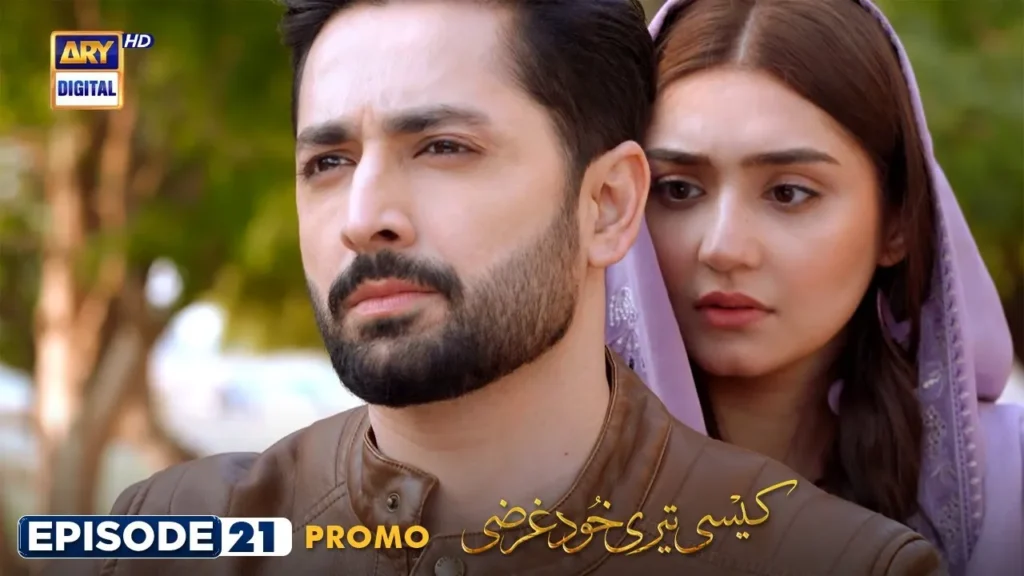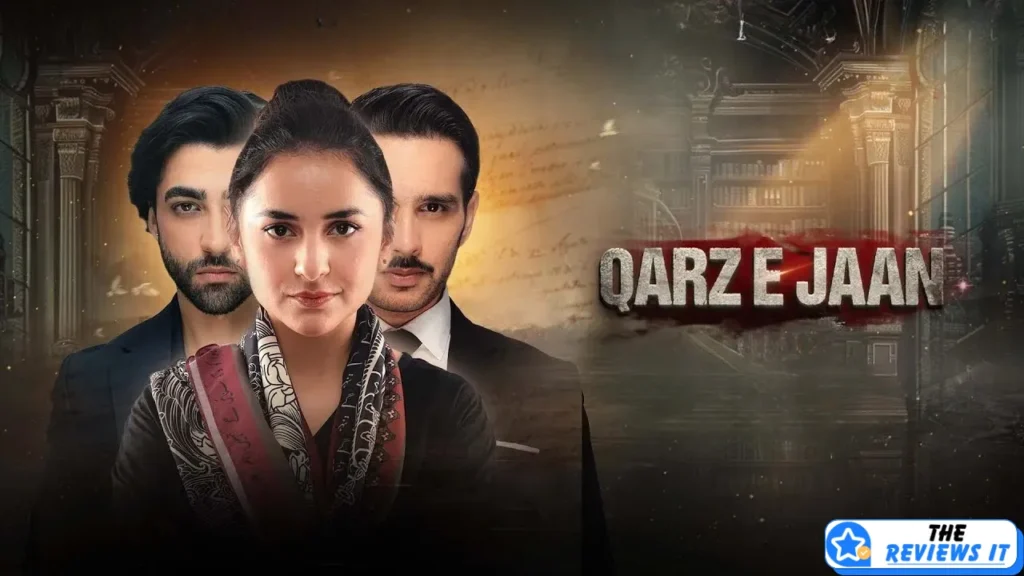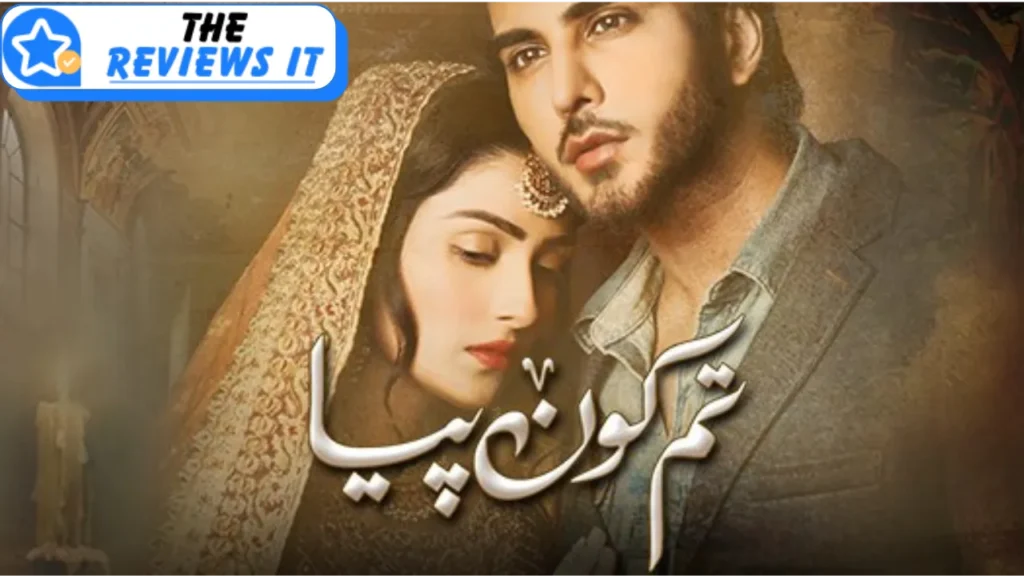In this Kaisi Teri Khudgarzi Drama Review, we explore a captivating narrative that blends love, power, and obsession. The story centers around Shamsher (played by Danish Taimoor), the stubborn and privileged son of a wealthy business tycoon, who falls deeply in love with Mehak (Dur-e-Fishan Saleem), a humble girl from a middle-class family. Their love story begins in an unconventional way, and as Shamsher’s obsession with Mehak grows, he stops at nothing to have her in his life—even if it means disregarding her wishes and his own family’s disapproval.
The drama brilliantly portrays the struggle between love and morality as Mehak begins to detest Shamsher for his aggressive tactics. While Shamsher’s actions are driven by his obsessive love, his family, led by his influential father Nawab Dilawar (Noman Aijaz) and mother (Atiqa Odho), becomes an obstacle, adding layers of family politics and traditional values. Meanwhile, Mehak’s parents (Shahood Alvi and Laila Wasti) face immense turmoil as they try to protect their daughter from the wrath of Shamsher’s privileged and toxic love.
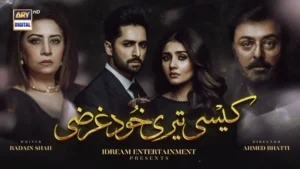
Plot Overview
Kaisi Teri Khudgarzi tells the gripping story of Shamsher, the determined and affluent son of a business magnate, who becomes infatuated with Mehak, a kind-hearted girl from a middle-class background. Their romance blossoms in a unique setting, but it quickly turns tumultuous as Shamsher’s relentless pursuit of love veers into obsession.
Key plot points include:
- Unconventional Meeting: Shamsher and Mehak’s love story begins unexpectedly, capturing the audience’s attention with their contrasting backgrounds. Their initial connection is filled with passion and excitement.
- Family Opposition: As their relationship develops, Shamsher’s family, particularly his parents, Mr. and Mrs. Nawab Dilawar, strongly oppose the match due to Mehak’s humble status. They represent an orthodox mindset that prioritizes family reputation and social status over individual happiness.
- Mehak’s Struggle: Mehak’s initial feelings for Shamsher start to wane as she witnesses his controlling behavior. Her cousin Ahsan (Hammad Shoaib), who is also her fiancé, offers her a more stable and supportive relationship, complicating her feelings further.
- Conflict and Turmoil: The drama intensifies as Shamsher refuses to accept Mehak’s rejection. His obsession leads to increasingly aggressive and manipulative actions, creating turmoil for Mehak and her family.
- Climactic Confrontations: Tensions reach a boiling point as both families confront each other, revealing deep-seated issues around class and the lengths one will go to in the name of love.
- A Journey of Self-Discovery: Throughout the turmoil, Mehak embarks on a journey of self-discovery, ultimately learning to stand up for her own values and desires in the face of Shamsher’s overpowering control.
As the story unfolds, Kaisi Teri Khudgarzi presents a powerful narrative about love, obsession, and the consequences of trying to control the hearts of others.

Characters and Performances
Kaisi Teri Khudgarzi features a compelling cast that brings its intricate characters to life, each adding depth to the narrative. Here’s a closer look at the key characters and their standout performances:
- Danish Taimoor as Shamsher:
Danish Taimoor delivers a powerful performance as Shamsher, the wealthy and stubborn son of a business tycoon. His portrayal captures the character’s transformation from a charming lover to a controlling and obsessive figure. Taimoor skillfully balances Shamsher’s vulnerability and aggression, making viewers both empathize with and despise him as he struggles with his feelings for Mehak. - Dur-e-Fishan as Mehak:
Dur-e-Fishan shines as Mehak, a humble and strong-willed young woman. Her performance beautifully conveys the emotional turmoil she experiences as she navigates her complex relationship with Shamsher. Fishan captures Mehak’s innocence and her gradual evolution into a self-assured individual who stands up against Shamsher’s obsession, making her a relatable and inspiring character. - Hammad Shoaib as Ahsan:
Hammad Shoaib plays Ahsan, Mehak’s cousin and fiancé. He delivers a commendable performance as the supportive figure who contrasts sharply with Shamsher’s controlling nature. Shoaib brings a sense of warmth and stability to his character, showcasing Ahsan’s genuine care for Mehak and his determination to protect her from Shamsher’s excesses. - Noman Aijaz as Mr. Nawab Dilawar:
Noman Aijaz brings gravitas to his role as Shamsher’s father, Mr. Nawab Dilawar. Aijaz effectively portrays the traditional patriarch who prioritizes family reputation over his son’s happiness. His commanding presence adds depth to the story’s exploration of family dynamics and societal expectations. - Atiqa Odho as Mrs. Nawab Dilawar:
Atiqa Odho, as Shamsher’s mother, complements Aijaz’s performance with her nuanced portrayal of a woman caught between her loyalty to her family and her concern for her son. Odho’s performance brings complexity to the character, showcasing her struggle to maintain family values while dealing with the consequences of Shamsher’s actions. - Shahood Alvi and Laila Wasti as Mehak’s Parents:
Shahood Alvi and Laila Wasti, portraying Mehak’s parents, effectively depict the turmoil and emotional strain they face as they navigate the societal pressures surrounding their daughter’s relationship. Their performances ground the story, adding layers of realism to the narrative. - Supporting Cast:
The supporting cast, including Laiba Khan, Tipu Shareef, Zainab Qayyum, and Emad Butt, also deliver commendable performances that enrich the storyline. Each character contributes to the overarching themes of love, family loyalty, and societal expectations.
In Kaisi Teri Khudgarzi, the ensemble cast brilliantly brings the characters to life, making each performance memorable. The actors effectively capture the complexities of love and obsession, ensuring that the audience remains engaged and invested in the unfolding drama.

Cast Name and Characters
| Actor | Character |
|---|---|
| Danish Taimoor | Nawabzaada Shamsher Dilawar |
| Dur-e-Fishan Saleem | Mehak Shamsher |
| Shehzeen Rahat | Sofia Aftab |
| Laiba Khan | Nida Ahsan |
| Zainab Qayyum | Andaleeb Rehan |
| Shahood Alvi | Mohammad Akram |
| Nauman Ijaz | Nawab Dilawar |
| Ayesha Toor | Farwa Dara |
| Atiqa Odho | Mehwish Dilawar |
| Emmad Butt | Shahmeer |
| Adnan Shah Tipu | Sheru |
| Farah Nadir | Erum Bakhtyar |
| Akhtar Hasnain | Rehan Ahmad |
Themes and Messages
Kaisi Teri Khudgarzi delves into several profound themes that resonate with viewers, exploring the complexities of human relationships and societal norms. Here are the main themes the drama addresses:
- Love and Obsession:
At its core, Kaisi Teri Khudgarzi explores the fine line between love and obsession. Shamsher’s passion for Mehak initially appears romantic, but as the story progresses, it becomes evident that his feelings are rooted in obsession. This theme highlights how love can sometimes distort reality, leading individuals to act irrationally and harmfully in the name of affection. The drama prompts viewers to reflect on what constitutes genuine love versus possessive behavior. - Manipulation and Control:
The narrative vividly portrays the dynamics of manipulation and control in relationships. Shamsher’s attempts to dominate Mehak’s choices and emotions serve as a cautionary tale about the dangers of toxic love. The drama effectively showcases how manipulation can erode a person’s sense of self-worth and agency, emphasizing the importance of healthy boundaries in romantic relationships. - Societal Expectations and Class Divide:
Kaisi Teri Khudgarzi also addresses the impact of societal expectations and class differences on personal relationships. Shamsher’s affluent background and his family’s conservative values clash with Mehak’s modest upbringing, creating a significant rift. The drama sheds light on the struggles faced by individuals who challenge societal norms, prompting discussions about classism and the importance of individual choice in matters of the heart. - Family Dynamics and Loyalty:
The influence of family on personal relationships is another critical theme explored in the drama. The conflict between Shamsher’s family values and his desire for Mehak illustrates how familial loyalty can sometimes lead to destructive choices. The story emphasizes the struggle between adhering to family expectations and pursuing personal happiness, highlighting the tension that can arise when love challenges traditional norms. - Self-Discovery and Empowerment:
As Mehak confronts Shamsher’s controlling behavior, her journey of self-discovery becomes a central element of the narrative. The drama conveys a powerful message about the importance of self-empowerment and the right to make one’s own choices in love and life. Mehak’s evolution from a passive participant to an empowered individual inspires viewers to prioritize their well-being and assert their autonomy. - The Consequences of Toxic Relationships:
The unfolding drama serves as a poignant reminder of the potential consequences of toxic relationships. As Shamsher’s obsession escalates, it leads to emotional turmoil not only for Mehak but also for their families. The drama encourages viewers to recognize the signs of toxic behavior and the importance of seeking healthier relationships.
Through these themes, Kaisi Teri Khudgarzi crafts a thought-provoking narrative that resonates with audiences, encouraging reflection on love, power dynamics, and the importance of self-identity. The drama serves as a reminder that true love is built on respect, trust, and understanding, rather than control and manipulation.

Direction and Cinematography
Kaisi Teri Khudgarzi is directed by Ahmed Bhatti, known for his ability to create engaging narratives with a strong visual appeal. The direction in this drama effectively captures the emotional depth of the storyline, guiding viewers through the tumultuous journey of love and obsession.
- Visual Presentation: The cinematography is commendable, showcasing beautiful landscapes and well-composed shots that enhance the overall viewing experience. The contrasting settings of Shamsher’s lavish lifestyle and Mehak’s humble background are visually striking, effectively highlighting the class divide central to the narrative.
- Directorial Choices: Bhatti’s direction skillfully balances the intense emotions of the characters with the overarching themes of the drama. The use of close-up shots during pivotal moments allows the audience to connect with the characters’ inner turmoil, while the pacing of scenes adds to the tension and drama.
- Overall Impact: While the visual presentation is generally strong, there are moments where the pacing feels slightly uneven, particularly in transitioning between high-stakes emotional scenes and quieter, more reflective moments. Nevertheless, the overall direction and cinematography succeed in creating a captivating visual spectacle that complements the narrative.
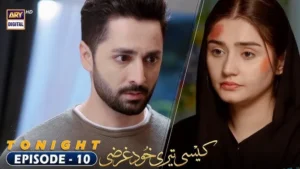
Pacing and Plot Twists
The pacing of Kaisi Teri Khudgarzi plays a crucial role in maintaining viewer interest. The drama employs a mix of intense confrontations and quieter, introspective moments, allowing the audience to process the evolving relationships and character dynamics.
- Engagement: The initial episodes effectively build momentum, introducing the characters and their conflicts. As the story unfolds, the pacing picks up, especially during critical confrontations between Shamsher and Mehak, which keeps the audience on the edge of their seats.
- Key Plot Twists: The drama incorporates several plot twists that add layers to the storyline. Shamsher’s gradual descent into obsession and Mehak’s struggle for autonomy create unexpected turns that challenge viewer expectations. These twists not only enhance the drama but also provoke thought regarding the nature of love and control.
- Overall Execution: While the pacing is generally well-executed, some episodes may feel slightly stretched, impacting the overall tension. However, the strategic placement of plot twists compensates for these moments, ensuring that viewers remain engaged and invested in the characters’ journeys.
Strengths and Weaknesses
Kaisi Teri Khudgarzi successfully weaves a complex narrative filled with emotional depth, but it also has areas that could benefit from improvement.
Strengths:
- Compelling Performances: The cast delivers strong performances, with Danish Taimoor and Dur-e-Fishan standing out. Their chemistry brings authenticity to their characters’ tumultuous relationship.
- Engaging Themes: The drama tackles significant themes such as love, obsession, and societal expectations, prompting meaningful discussions among viewers.
- Visual Appeal: The cinematography enhances the storytelling, with striking visuals that complement the emotional weight of the narrative.
Weaknesses:
- Pacing Issues: As mentioned, some episodes may feel prolonged, leading to occasional lulls in excitement. Tightening the pacing could enhance overall engagement.
- Character Development: While the main characters are well-developed, some supporting characters could benefit from deeper exploration to enhance their relevance in the story.
- Predictability: Certain plot elements may feel predictable to seasoned viewers of the genre, which could diminish the impact of key twists.
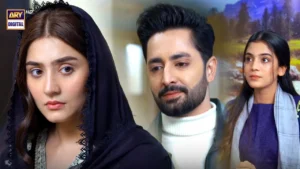
Audience Reception
Kaisi Teri Khudgarzi has sparked a varied response from viewers, showcasing both admiration and criticism. Many fans have praised the performances of Danish Taimoor and Dur-e-Fishan, applauding their ability to portray complex emotions and the chemistry they share on screen. The themes of love, obsession, and family dynamics resonated with audiences, prompting discussions about the portrayal of relationships in contemporary society.
However, the drama has not been without its controversies. Some viewers expressed concern over the portrayal of obsessive love, arguing that it could send negative messages about unhealthy relationships. The dynamics between characters often led to debates on social media, with many discussing the implications of Shamsher’s behavior and Mehak’s responses. This dialogue reflects a broader societal conversation about the representation of toxic relationships in media.
Overall, the audience reception has been a mix of admiration for its storytelling and performances, tempered by critical discussions on the messages it conveys.

Final Verdict: Is Kaisi Teri Khudgarzi Worth Watching?
In conclusion, Kaisi Teri Khudgarzi is a compelling drama that offers a captivating exploration of love and obsession. The strong performances, particularly from the lead actors, combined with its thought-provoking themes, make it a worthwhile watch. Despite some pacing issues and controversial themes, the drama effectively engages viewers and encourages discussions about complex emotional dynamics.
If you enjoy stories that delve into the darker aspects of love and relationships, this drama is definitely worth tuning in for.
Personal Opinions: My Take on Kaisi Teri Khudgarzi
Personally, I found Kaisi Teri Khudgarzi to be a gripping narrative that kept me invested from start to finish. One of my favorite moments was when Mehak stood up for herself against Shamsher, showcasing her growth and determination. This pivotal scene not only marked a turning point in her character arc but also sent a powerful message about self-empowerment.
The emotional intensity in several scenes left a lasting impression on me, particularly the moments that highlighted the conflict between love and obsession. The drama’s ability to evoke strong feelings and provoke thought about societal norms is commendable.
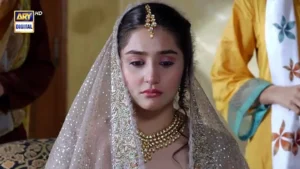
Conclusion: Wrapping Up the Kaisi Teri Khudgarzi Drama Review
Kaisi Teri Khudgarzi is more than just a tale of romance; it’s a reflection on the complexities of human emotions and the societal pressures that shape our relationships. While it has its flaws, the drama succeeds in prompting meaningful conversations and engaging its audience. For anyone intrigued by narratives that challenge traditional notions of love and explore the darker sides of passion, this drama is a must-watch. As we navigate the landscape of relationships in our lives, Kaisi Teri Khudgarzi serves as a powerful reminder of the importance of balance, respect, and understanding in love.

